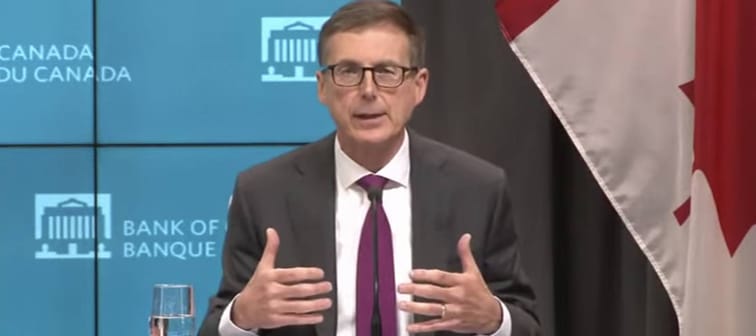Although the country’s economic rebound was stronger than expected over the summer, Bank of Canada Governor Tiff Macklem told a press conference “the very rapid growth of the reopening phase is now over.”
“We expect the fallout from the pandemic will have some long-lasting effects on future economic growth,” said Macklem. “We’re going to get through this, but it’s going to be a long slog.”
It’s a tough road ahead, but in the meantime both homeowners and homebuyers can take great advantage of the bank’s plan to fight through the fallout.
What does a low overnight rate mean for Canadians?

A low overnight rate makes it cheaper for banks to borrow money. Although that doesn’t directly affect the interest you’ll pay on things like mortgages and credit cards, banks do typically pass those savings on to you.
When the overnight rate is low, you can expect to see a low prime rate, which is the amount of interest the big banks charge their best customers. The interest rates on all kinds of loans are linked to the prime.
Canada’s prime rate is currently sitting at 2.45% — the lowest it’s been since the financial crisis of 2008. With borrowing so cheap, the Bank of Canada hopes to encourage Canadians to inject more money into the economy and stimulate growth.
The central bank intends to hold its benchmark policy rate steady until inflation bounces back to 2% — which, according to its projections, won’t happen until sometime in 2023.
Unexpected vet bills don’t have to break the bank
Spot Pet Insurance offers coverage for treatment of accidents, illnesses, prescriptions drugs, emergency care and more.
Plus, their preventative care plan covers things like routine check-ups, microchip implantation, and vaccinations, if you want to give your pet the all-star treatment while you protect your bank account.
Get A QuoteIs now the right time to borrow or refinance?

“Interest rates are likely to stay low for probably a generation,” former Bank of Canada governor Stephen Poloz told Bloomberg earlier in October, adding that the bank is doing just about everything it can do.
That means, so long as you’ve got a solid credit score, conditions aren’t going to get any better than this.
Mortgage rates are cheaper than ever right now, so if you’re in the market for a new home your timing couldn’t be better. And if you’re already a homeowner, refinancing into one of today’s bargain rates could shave hundreds of dollars off your monthly bill.
Even though mortgage rates are low across the board, they can still vary significantly between different lenders. You’ll want to do your homework.
If you don't have time to hunt for the best mortgage yourself, get Homewise to work the market for you. This online brokerage will negotiate on your behalf with more than 30 big banks and other lenders, completely free, and it only takes five minutes to apply.
What if your job is affected?

The last few months have been a boon for many borrowers, but the coronavirus has hit other segments of the population hard.
In its October update, the Bank of Canada stated that “the economic effects of the pandemic are highly uneven across sectors and are particularly affecting low-income workers.” Even though Canada has regained most of the jobs lost since the spring, the outlook is still shaky for industries like food services, hospitality and recreation.
“We are still more than 700,000 jobs below our pre-pandemic level,” Macklem said during the Oct. 28 press conference, adding that the pandemic is “likely to cause long-lasting damage to some people’s job prospects.”
If you think you might fall behind on your mortgage payments someday, you may want to consider downsizing to more affordable accommodations. Anyone who lives in Ottawa, Calgary or a condo in Toronto can find out exactly how much their property is worth with a free home valuation from the website Properly.
And no matter what situation you’re in, it’s a smart idea to cut down on your monthly spending during this uncertain time. It doesn’t have to be harsh; for example, you can try saving on your groceries and other essential purchases by using the Ampli cash back app when you shop.
Trade Smarter, Today
Build your own investment portfolio with the CIBC Investor's Edge online and mobile trading platform and enjoy low commissions. Get 100 free trades and $200 or more cash back until March 31, 2025.







